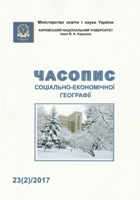Екологічні знання та стале планування в Нігерії: вплив на народність йоруба в Південно-Західній Нігерії
Анотація
У доколоніальні часи африканські народи виживали, набуваючи і зберігаючи общинні знання про навколишнє середовище і взаємовідносини між людськими і нелюдськими елементами. Стаття заснована головним чином на вторинних даних і розглядає взаємини між африканськими народами, зокрема народом йоруба на південному заході Нігерії, і землею – і як розуміння цих відносин може допомогти у пошуках більш ефективного та сталого регіонального планування. В роботі вивчаються екологічні ідеї та переконання місцевого населення йоруба та їх вплив на взаємодію людей з навколишнім середовищем. Результат показує, що саме сучасне планування може отримати від культурно-екологічних відносин корінних народів.
Завантаження
Посилання
2. Agrawal, A. (1995). Dismantling the divide between indigenous and scientific knowledge. Development and Change, 26(3), 413-439.
3. Agawal, A. (1995). Indigenous and scientific knowledge: some critical comments. IK Monitor 3(3). Available at: http://www.nuffic.nl/ciran/ikdm/3-3/articles/agrawal.html.
4. Briggs, J. (2005) The use of indigenous knowledge in development: problems and challenges. Progress in Development Studies, 5(2), 99-114. Available at: http://eprints.gla.ac.uk/archive/00001094/
5. Brokensha, D., Warren, D., Werner, O. (eds) (1980). Indigenous knowledge systems and development, Lanham: University Press of America.
6. Casimirri, G. (2016). Problems with integrating traditional ecological knowledge into contemporary resource management, Proceedings of the XII World Forest Congress, Quebec, Canada. Available at: http://www.fao.org/docrep/ARTICLE/WFC/XII/0887-A3.HTM
7. Compton, J. (1989). The integration of research and extension, pp. 113-136 in J.L. Compton (ed) The transformation of international agricultural research and development. Boulder: Lynne Rienner.
8. Copra, F. (1982). The Turning Point. Simon and Schuster.
9. Dekens, J. (2007). Local Knowledge for Disaster Preparedness: A Literature Review. International Centre for Integrated Mountain Development, Kathmandu.
10. Fernando, J.L. (2003). NGOs and production of indigenous knowledge under the condition of postmodernity. Annals of the American Academy of Political and Social Science, 590, 54-72.
11. FAO (2014). State of the World's Forests. Food and Agriculture Organization of the United Nations, Rome. Available at: http://www.fao.org/3/a-i3710e.pdf
12. Harisha, R.P., Padmavathy, S., Nagaraja, B.C. (2016). Traditional Ecological Knowledge (Tek) And Its Importance In South India: Perspective From Local Communities in Applied Ecology and Environmental Research, 14(1), 311- 326
13. Harisha, R.P., Padmavathy, S. (2013). Knowledge and use of the wild edible plant in two communities in MalaiMadeshwara Hills, Southern India. International Journal of Botany, 9(2), 64-72
14. Hill, S. (2008). Traditional Knowledge. Unpublished Ph.D. Seminar presentation, University of Manitoba.
15. Gupta, A. (1992). Building upon people's ecological knowledge: Framework for studying culturally embedded CPR institutions. Ahmedabad: Indian Institute of Management, Center for Management in Agriculture.
16. Mbiti, S. John (1969) Introduction to African Religion. Available at: www.harford.com/archives/30/197.html
17. Mercer, J., Dominey–Howes, D., Kelman, I., Lloyd, K. (2007). The potential for combining indigenous and western knowledge in reducing vulnerability to environ- mental hazards in small island developing states. Environmental Hazards, 7(4), 245-256.
18. Nadasdy, P. (1999). The politics of TEK: power and the “integration” of knowledge. Arctic Anthropology, 36,1-18.
19. Niamir, M. (1990). Herder' decision-making in natural resource management in arid and semi-arid Africa. Community Forestry Note 4. Rome: Food and Agriculture Organization. BO9781139030717
20. Reyes-Garcia, V., Huanca, T., Vadez, V., Leonard, W., Wilkie, D. (2006). Cultural, Practical and Economic value of Wild Plants: A quantitative study in the Bolivian Amazon. Economic Botany 60(1), 62-74 South Africa, South African Journal of Science, 99, 23-25.
21. Sillitoe, P. (1998). The development of indigenous knowledge: a new applied anthropology. Current Anthropology, 39(2), 223-252.
22. Sillitoe, P. (2000). Let them eat cake: indigenous knowledge, science and the "poorest of the poor". Anthropology Today, 16(6), 3-7.
23. Tran, P. and Shaw, R. (2007). Towards an integrated approach of disaster and environmental management: a case study of Thua Thien Hue province in central Vietnam. Environmental Hazards, 7(4), 271-282.
24. United Nations CBD (2016). Traditional Knowledge and the Convention on Biological Diversity. Available at:
25. UNESCO (2016). Synergies between Scientific 7 Indigenous knowledge in Local and Indigenous Knowledge Systems (LINKS). Available at: www.unesco.org/links
26. UNESCO (2002). Local and Indigenous Knowledge Systems. Available at: http://www.unesco.org/ links/
27. U.S. Fish and Widlife Service (USWFS) (2011). Traditional Ecological Knowledge for application by service scientists. Available at: http://.www.fws.gov.nativeamerican/graphics/TEK_Fact_Sheet.pdf. June, 2017.
28. Warren, D.M. (1990). Using indigenous knowledge in agricultural development. World Bank Discussion Paper 127. Washington DC: World Bank.
29. Warren, D.M., G.W. von Liebenstein, L. Slikkerveer (1993). Networking for indigenous knowledge. Indigenous Knowledge and Development Monitor, 1(1), 2-4.
Авторське право (c) 2017 Oladayo Ramon Ibrahim

Цю роботу ліцензовано за Міжнародня ліцензія Creative Commons Attribution 4.0.




